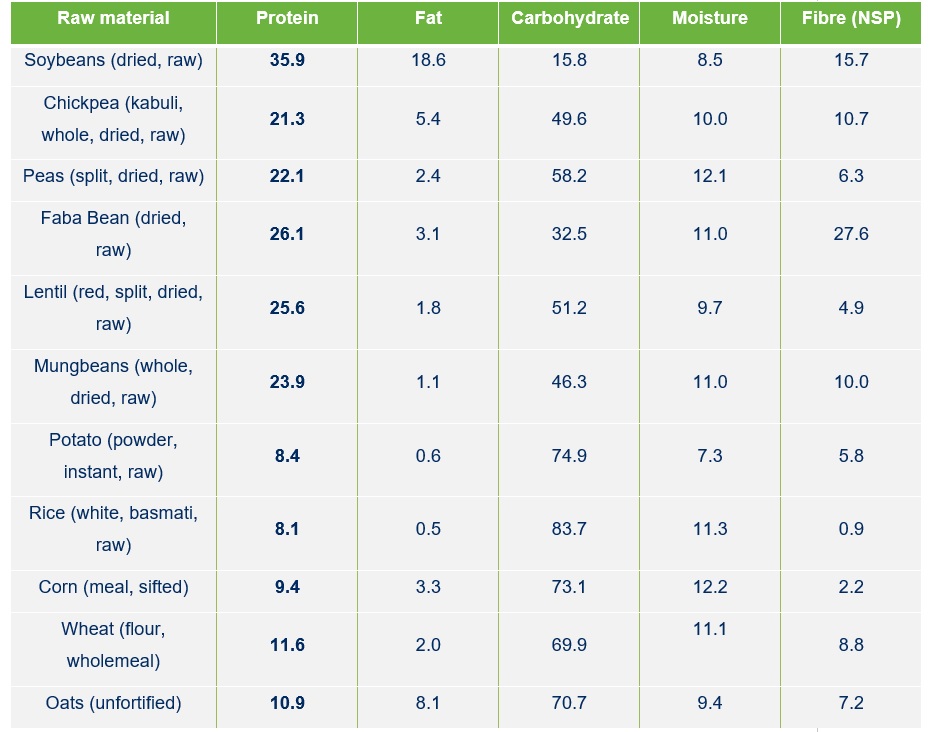Plant-based proteins can be found in many food and beverage applications, such as: bakery wares, meat or fish products, ready-to-serve dishes, sauces, dietetic products, fresh deli products etc. They are highly versatile, they provide a number of different functionalities in food systems, and they are also very nutritious.
Beneficial aspects of use of plant-based proteins
As mentioned above, plant-based proteins have multiple and varied beneficial functionalities, and as concentrated sources of protein their addition leads to improved:
- Texture: for example, water retention/absorption capacity, gel formation, emulsification, anti-foaming etc.
- Palatability and mouth feel: for example pleasant flavour profile and smooth texture.
- Nutritional composition: improvement of protein to fat (P/L) ratio, supply of beneficial amino acids, complementary to animal protein.
- Sustainability: safety of supply and increased food security.
Moreover, plant-based proteins have acceptability and wide use in vegetarian and vegan products, according to the relevant labelling schemes.
Table: Typical nutritional composition (%) of agricultural raw materials used for plant-based proteins. Source: McCance and Widdowson (UK FSA)

Due to the different properties of each plant-based protein, they can be combined to achieve greater qualitative and nutritional performance.
The production of plant-based proteins also presents a positive environmental outcome compared to some animal production. Main impacts per kg of protein produced are:
- Reductions in cultivated area
- Lower energy requirements
- Less water needed
- Reduced greenhouse gas emissions.
Furthermore, soy and pulse (lupin, faba beans, peas) roots fix nitrogen so their cultivation can enrich the soil, allowing limited nitrogen inputs not only for their own cultivation but also for subsequent crop plantings. They can be used in crop rotation, for instance before wheat cultivation: the beneficial impact on the overall sustainability of crops as a result, can be significant.
Meat
Vegetable proteins have been used very effectively by manufacturers of meat products and meat preparations for many years to achieve discernible benefits which help to meet the demand of consumers for tasty and nutritious foodstuffs at affordable prices.
In general terms, vegetable proteins can normally be incorporated into processed meat products using existing equipment. When used in meat products, vegetable proteins maintain or may even improve their nutritional characteristics since vegetable proteins contain significant amounts of the essential amino acids, as demonstrated by their high Protein Digestibility Corrected Amino Acid Scores (PDCAAS) and they also contain no cholesterol. Use of sustainable vegetable protein will also extend limited meat supplies whilst using less of the earth’s valuable resources to feed growing populations.
There is a wide range of vegetable protein ingredients that can be used in meat applications, and by choosing the correct vegetable protein, meat product manufacturers can control the texture and mouthfeel of their products whilst improving yields, reducing cooking losses and making their products more appealing.
Vegetarian & vegan
Whether looking to satisfy the needs of traditional vegetarians or those of converted meat-eaters, manufacturers of both vegetarian and vegan products have used vegetable proteins very effectively for many years to achieve the eating qualities demanded by their consumers. Many vegetable proteins have a very high PDCAAS and so can be used to create extremely nutritious foods.
By choosing the correct combination of vegetable proteins, manufacturers can control the texture and mouthfeel of their products whilst optimising yields, reducing cooking losses and making their products more appealing.
Infant food
The ideal source of nutrition for babies is the mother’s milk. Should this not be available, or the baby be intolerant to it, the common second choice normally advised is cow or goat milk-based infant formula.
However, should the baby be intolerant to the lactose or any other constituent in dairy products, soya proteins can offer a primary source of nutrition the baby may be able to accept.
Bakery & Cereals
Sports Nutrition
Meat Alternatives



